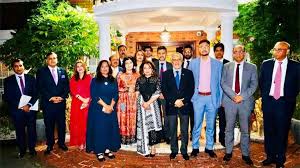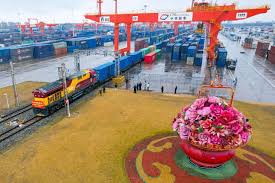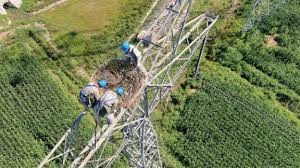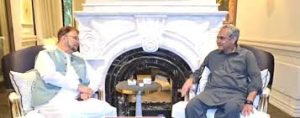DPM Dar interacts with British Parliamentarians of Pakistani origin

London: Deputy Prime Minister and Foreign Minister, Senator Mohammad Ishaq Dar had a detailed and comprehensive interaction with British Parliamentarians of Pakistani origin, at a dinner hosted by the High Commissioner Dr. Mohammad Faisal at the Pakistan House in London.
The dinner was attended by the Deputy Speaker House of Commons Nusrat Ghani, Yasmin Qureshi (MP), Lord Qurban Hussain, Baroness Nosheen Mubarak, Lord Zameer Chaudhry, Baroness Sayeeda Warsi, Baroness Shaista Gohir, Mohammad Afzal Khan (MP), Naseem Shah (MP), Imran Hussain (MP), Tahir Ali (MP), Zubair Ahmed (MP), Adnan Hussain (MP), Mohammad Yasin (MP) and Ayoub Khan (MP).
In his opening remarks, the Deputy Prime Minister congratulated the newly elected British-Pakistani Members of Parliament and reiterated that Pakistan-UK relations were founded on strong links of history, culture and common aspirations for peace, security and development.
In the recent elections, 15 members of Pakistani heritage were elected to the British Parliament, which demonstrates the strength of British democracy and also the success of British citizens of Pakistani origin.
The Deputy Prime Minister briefed the Members of Parliament on his government’s roadmap for the economic revival of Pakistan. He recalled that during the government of Prime Minister Nawaz Sharif from 2013 to 2017, Pakistan had grown to the world’s 24th largest economy and was projected to become a member of the G20.
The menace of terrorism had also been contained at an immense cost of blood and treasure. However, political instability, beginning in 2018, had derailed Pakistan’s economic trajectory. Moreover, the previous government’s policy of appeasing and rehabilitating extremist groups, like the Tehreek-e-Taliban and the release of over 100 hardened terrorist criminals, had led to a resurgence of terrorism.
The Deputy Prime Minister said that the government will not allow any internal or external elements, intent on fomenting political instability, to derail Pakistan’s journey to development and prosperity.
There could be no question of engaging with those who have attacked state institutions and used international forums to undermine the national interest. He insisted that the government would not be deterred by any pressure or challenge in this regard.
The Deputy Prime Minister stressed that the government was committed to putting Pakistan back on the road to economic growth and development that the country had been charting in 2017. The difficult and politically unpopular measures taken by the recent government are now beginning to bear fruit. Inflation had been curtailed to single digit and the current account deficit brought under control with stable currency.
There was across-the-board institutional support for economic reform and the Special Investment Facilitation Council, set up by the government last year, was drawing significant foreign investors interest in Pakistan’s energy, mining, IT and agriculture sectors.
The Deputy Prime Minister asked the Members of Parliament for suggestions on how the government could draw more British foreign direct investment in Pakistan and increase the bilateral trade volume. Deputy Prime Minister also stressed that it was important for young British-Pakistanis to stay connected with their roots and noted that the Government of Pakistan had introduced a new visa-free policy to encourage Pakistani expatriates to visit Pakistan.
The Deputy Prime Minister thanked the British Parliamentarians for raising the issue of atrocities inflicted upon the innocent people of Indian Illegally Occupied Jammu & Kashmir and the people of Gaza.





